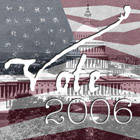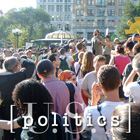
|
DESPITE FEDERAL LEGISLATION & SIX YEARS OF REFORM, MAJOR SECURITY FLAWS PERSIST WHICH COMPROMISE ELECTION INTEGRITY 25 June 2006 The 2000 election process gave clear evidence that the established system for running elections and counting votes in the United States is not cohesive, not fool-proof and not secure against tampering. Congress took action to reform voting standards nationwide to "Help America Vote". But that legislation suffered one fatal flaw: while promoting the shift to touchscreen ballots, it did not require that electronic balloting machines produce a paper record that could be hand-checked. Most states' elections laws require manual recounts in cases where extremely narrow margins of victory occur, or where there are anomalies or evidence of possible wrongdoing. But as the transition has been made to electronic voting machines, many states have failed to implement solutions that permit their own laws being carried out in such cases. Repeatedly over the last 6 years, spot tests, "red-team" intensive exercise testing, and scientific studies, have shown that the most widely used touchscreen machines, which lack any hard copy of the voting process, can be tampered with, altering or even erasing vote counts or candidate selections. Without a paper record, there is no way to return to the "will of the voter" —an important legal standard— to confirm what the real substance of the electoral process was. Votes literally disappear. Facing public outcry and burgeoning new voter-rights movements, 26 states have tackled the no-recount problem of touchscreen machines by enacting legislation to require paper records of electronically cast votes. These laws are designed to prevent accidental dissolution of election results or outright malicious manipulation or hacking to sway elections. But that leaves 24 states that have not yet taken action to forestall such electoral travesty. Several states have attempted to institute mandatory ID-checking at polling places, without providing provisional ballots for voter whose status is challenged by partisan "observers". The US House of Representatives is reviewing in committee a proposed bill that would mandate photo ID to prove US citizenship at polling stations in any federal election. The bill, presented by Rep. Henry Hyde (R-IL), would require identification that some argue amounts to an illegal poll tax on underprivileged voters. Many residing in poor urban areas do not hold driver's licenses or passports, and would be required to pay state or federal fees in order to obtain photo ID before being allowed to cast their votes. Electiononline.org lists 18 states that provide no recourse whatsoever for voters whose names were unfairly erased from state registration lists. Such "purges" are justified as an attempt to guarantee that convicted felons (which in some states are forbidden from voting) cannot vote or that the identity of people who have moved or passed away not be used to cast unlawful votes. But Utne magazine reports in its July/August edition that not one case has been found of individuals trying to vote illegally under someone else's identity. Many states seem more determined, however, to address this theoretical threat to ballot integrity, while they overlook or choose not to address real security flaws designed into new voting technology. Many across the political spectrum complain that election reform efforts have been marred by partisan officials seeking to use the guise of reform to determine which votes will count, in order to protect their party's hold on power. This is not mere speculation or doomsaying; it is a fact of the current system and several stunning examples have played out in recent years. Georgia has attempted to impose mandatory photo ID, and would require fee payments and sometimes long travel to obtain ID sufficient to qualify at polling places, a Republican-backed effort that most adversely affected low-income pro-Democrat voters and minorities. In Florida in 2000, where hundreds of thousands of legal voters (97% of the total purged) were unlawfully removed from voter registration lists, the Secretary of State in charge of running the election doubled as head of the Bush-Cheney campaign in her state. In the 2004 Florida election, the Broward County elections supervisor, a Republican appointed by Gov. Jeb Bush to oversee a heavily Democratic county, was heavily criticized after 58,000 absentee ballots disappeared without a trace. No disciplinary action was taken, and no investigation or new proposals have been implemented to avoid a repeat of that severe irregularity. In Ohio, where three election workers were just indicted for tampering with the 2004 presidential vote count, Sec. of State Blackwell had tried to disqualify voters whose registrations (without their knowledge) were not filed on 80-pound test card stock, while overseeing the implementation of new paperless voting machines and serving as co-chair of the Bush-Cheney re-election campaign in his state. (The 80-pound card stock rule was abandoned after public outrage over the issue.) Other measures have been taken to narrow availability of election services. Utah has discontinued publication of a bilingual Spanish-English election information pamphlet amid concerns it might violate the state's English-only law. Congress is debating English-only initiatives which could form part of a negotiated immigration reform package, but it is unclear whether such laws can be upheld in light of the First Amendment. Other states permit voters to cast their votes in several different languages, depending on their preference, and it has long been considered a hallmark of voting rights that restricting availability of electoral information based on language was an undue constraint on voting rights. There is no way to guarantee the security of American elections or of US citizens' voting rights unless certain fundamental principles are embraced and are enforced under national legislation: 1) that technicalities should never preclude a citizen from exercising the vote; 2) that all ballots must be recorded as hard copies, on paper; 3) that no money can be required in exchange for the right to access the polls; 4) that no partisan officials may be involved in election supervision; 5) that electronic machines must be more secure against tampering than any other computing system. [s]
STORY UPDATE: As noted by a Sentido reader, paperless touchscreen balloting machines are not the only machine-based voting technique vulnerable to tampering. Punch-card readers can be calibrated to miss, exaggerate or misread marked votes. And optical-scan paper ballots can record figures not accurately representing the markings on ballots. The standard for human certainty is a heavily monitored manual count, but this is both impractical as a universal practice and contains obvious security flaws, including human intent and procedural manipulation. So hand counts are required as a stabilzing recount measure, while the gold standard now seems to be a printout ballot which the voter can verify as representing his or her true intent and which must be readable both by the naked eye and by a secondary electronic reader. [s] BACKGROUND: Since the 2000 election, voting technology has become a major issue in US elections regimens and regulations; touchscreen balloting machines, which legislatures seem to have favored as a way to record votes accurately, eliminating the 'hanging chad' problem, were designed with no paper record and have proven insecure and susceptible to tampering. Now, 26 US states have passed laws requiring paper trails, and 13 more, plus Washington, DC, have proposed laws "not yet enacted". [Full Story] SAN DIEGO COUNTY SENT VOTING MACHINES HOME WITH POLL WORKERS ON EVE OF ELECTION Reports have emerged that according to the San Diego registrar of voters, poll workers in San Diego county took tamper-susceptible Diebold voting machines home on the eve of the election. In some cases, poll workers may have had unsupervised access to the machines for a week or longer. [Full Story] TEXAS REDISTRICTING FOUND ILLEGAL BY JUSTICE LAWYERS, FINDINGS OVERRULED New documents show Justice Department lawyers unanimously found the Texas Congressional redistricting plan to be illegal. But that finding was overruled by top Justice officials and the staff involved in the research and analysis "were subjected to an unusual gag rule", this according to the Washington Post. [Full Story] |
||||||||||||||||||||
|
|||||||||||||||||||||









